As cannabis legalization continues an inexorable march across the United States and more jurisdictions embrace adult use, a multi-billion-dollar question repeatedly surfaces: How do we curtail the black market? In an industry where the average nationwide price of licensed products is two to three times higher than illicit replicas, an alarming number of consumers roll the dice with unregulated goods, using knockoffs and fakes that are untested and often unsafe.
California may exhibit the most egregious example of the problem. When voters approved recreational use in November 2016, it was a watershed moment—one that would have ramifications well beyond the industry’s bounds. Three years later, the results aren’t pretty.
Proponents of legalization in the Golden State projected an excise tax windfall of $1 billion a year, but revenue fell far short in 2019 at a paltry $288 million. For 2020, the state projects a modest $359 million. While some of the shortfall can be attributed to the limited number of retail licenses and the high cost of heavily taxed products, the elephant in the room is the black market and the growing presence of forged products.
The companies most frequently targeted by counterfeiters are extract-segment leaders that have created national buzz on social media platforms. For these companies, counterfeiters represent a real threat to the integrity of their brands and their very survival in hyper-competitive markets. For the groups manufacturing counterfeit products and profiting from the slick packaging and branding of legitimate products, things have never been better.
A one-stop distro shop
Strip malls and generic office suites are commonplace in U.S. suburbs. Hundreds of them exist in California’s East Bay area, scattered in cities from Oakland to Livermore. Some have bogus signage; others simply have tinted windows and nondescript façades. Neighboring businesses might be surprised to learn cannabis companies have been using these office suites for years to blend into the suburban landscape, and they use the spaces for everything from packaging products to storing cash in vaults. Such locations also are popular with black market and counterfeit product makers.
As we walked into one clandestine facility recently, the owner—who wishes to remain anonymous—was quick to point out the wide variety of cannabis vape cartridges stockpiled in the front room—thousands of them, stacked floor to ceiling, in knockoff packages that looked identical to those used by the legitimate brands. In the hallway, shelves brimmed with edibles and an array of tinctures. CBD products sat alongside those containing THC. The inventory rivaled some of the smaller dispensaries in the Bay area, and the owner said many of his regular customers are unlicensed delivery services that operate in cities all across the region.
“Most of these delivery guys are still on Weedmaps, so it’s easy for people to dial them up and get deliveries within a few hours,” he said, noting that his business hasn’t dropped off at all since California moved to a regulated adult-use industry in 2018. “The only big difference I’ve seen is in the variety and volume of counterfeit products.” The most popular products he sells on a regular basis, he said, are the ones rappers and other celebrities hype on Instagram and other social media platforms. “Kingpens and Heavy Hitters are big sellers, and the sour candies and gummies are always in high demand, although people don’t care as much on the brand with those,” he said.
While vape oil cartridges have been the main target for counterfeiters, who easily can purchase copycat packages on eBay and Alibaba, counterfeit versions of popular flower and edibles brands are on the rise.

Sweet Grass Kitchen, founded in 2009, was one of the original edibles brands in the U.S.; it remains the largest baked goods company in Colorado, with accounts in about 350 shops, according to marketing director Jesse Burns. Several years ago, a counterfeiter began selling fake Sweet Grass cookies in New York City, labeling them with potency levels two or three times what the company’s official products in Colorado contained. In 2016, an anonymous tipster sent the company photos of the fake products. That was the first time Burns and his Sweet Grass colleagues learned about the ruse.
“At the time, reputable brands could command higher prices in other states because people would assume they were tested and had accurate dosing,” said Burns. “Since we’ve been on Netflix and History Channel, there is awareness of our products in states all over the country where we don’t sell. So, it makes sense people would target our brand to create black-market fakes.
“It was mind-blowing how accurate the label was, right down to our state license number,” he added. “The scheme was trying to leverage as much of the brand and reputation as possible to command a higher price.”
When Sweet Grass representatives called the New York Police Department, officials showed no interest in the situation and there was no follow-up investigation, Burns said.
A ready market for knockoffs
While the Bay area has been a major hub for California’s black market for decades, Los Angeles recently has become the national epicenter for counterfeit vape and edibles products. Hundreds of shops in downtown L.A. sell fake packaging and empty vape cartridges, and knockoff Heavy Hitter and Kingpen cartridges can be found for a few dollars each.
Local and state police make occasional busts, but the problem is so widespread a much more concerted and coordinated effort would be required to make a small dent in the illicit packaging market. In the fall of 2019, 874 licensed dispensaries existed in the state, according to the Bureau of Cannabis Control (BCC), and the United Cannabis Business Association reported nearly 3,000 illegal dispensaries and delivery services continued to operate. The anomaly is due in large part to the fact only 20 percent of California cities allow cannabis dispensaries, and penalties for unlicensed operators are minimal. California has the unwelcome distinction of being the only state to legalize recreational cannabis and see a year-over-year reduction in legal sales.
Alex Traverso, a spokesman for the BCC, said counterfeiting “is certainly an issue we’re aware of. A lot of times when our enforcement team is working to shut down illegal operators, counterfeit products—particularly vape pens and cartridges—are found on-site.”
He noted the agency is trying to discourage consumers from shopping at unlicensed dispensaries and warn people about counterfeit products through its “Get #WeedWise” public awareness campaign. Beyond that, the BCC is engaged in a daunting game of whack-a-mole with the hundreds of unlicensed shops and delivery services across the state.
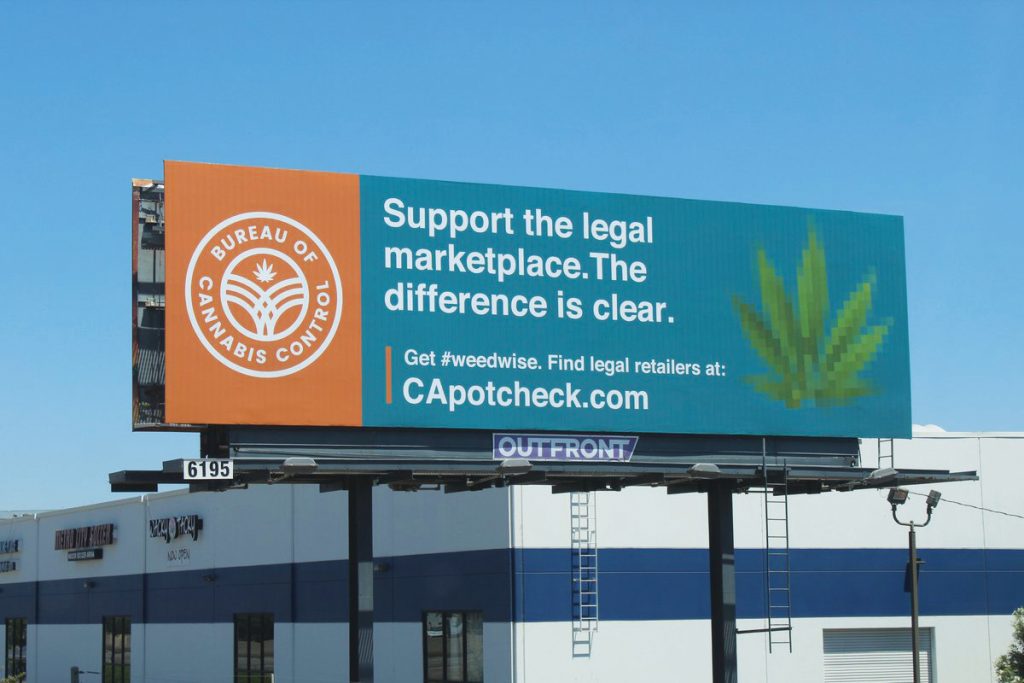
“Our enforcement team continues to work on shutting down illegal operators statewide. We receive many complaints about illegal activity, and we follow up on every one of them,” Traverso said. “The vast majority of the complaints are about unlicensed retail activity. Our team builds cases and ultimately serves search warrants and takes all the inventory on site. From there, they try to work backward and learn as much as they can about where the products came from so we can hit the illegal activity at the manufacturing site.”
While California remains the source of most black market and knockoff products in the U.S., counterfeiters in other parts of the country are ramping up operations and becoming hubs of their own. One high-profile counterfeit operation in Wisconsin was exposed in 2019, headquartered in a condo in Kenosha County. Law enforcement seized more than 31,000 pre-filled, one-gram THC vape cartridges, about 98,000 unfilled vape cartridges, fifty-seven Mason jars of “refined liquid THC,” and thousands of empty vape cartridge boxes and packaging. The “ringleader,” 20-year-old Tyler T. Huffhines, was buying jars of distillate in California and manufacturing thousands of vape cartridges after returning home.
Operations like this now exist in cities and towns across the U.S., challenging cannabis companies that have built popular brands. They are looking for a way to combat a problem that has spread faster and farther than anyone might have expected.
Lost revenue and bigger threats
Since recreational use became legal in California, there have been more illegal cannabis dispensaries in the state than licensed shops. While the legit industry racked up about $3 billion in sales in 2019, it’s estimated unregulated operations took in three to four times that amount. New Frontier Data reported that as much as 80 percent of the marijuana sold in California in 2018 came from the black market—an estimated $3.7 billion, or about four times the size of the legal market that year. Nationally, New Frontier estimates illegal sales total about $70 billion annually, which represents about seven times the size of the legal market.
While it’s difficult to put a dollar amount on revenue by counterfeit type, BDS Analytics estimated concentrates represent 30 percent of the market in the U.S. The figure has been rising steadily since 2017, when it was 24 percent. Edibles, another widely counterfeited segment, represents about 13 percent of the market.
The problems associated with counterfeit products go beyond lost revenue, though. A consumer’s bad experience with a knockoff product can have a detrimental impact on the brand and diminish sales on the legal market.
Of course, the most egregious and damaging aspect of the counterfeit cannabis business has been the mysterious lung illnesses linked to vaping that appeared in every state across the U.S. in 2019. Since the Centers for Disease Control and Prevention began investigating the outbreak of “e-cigarette and vaping product use associated lung injury” (EVALI), doctors have reported more than 2,500 cases. All the samples of damaged lung tissue contained traces of vitamin E acetate, which is commonly used as a nutritional supplement and in skincare products, but can be hazardous when inhaled. Since THC distillate costs about $5,000 per kilogram for high-purity stock, black market producers can save money by using other, cheaper ingredients to mimic the look of legal distillate. One of the most popular thickening agents is vitamin E acetate, which is colorless and odorless and has a similar viscosity to THC oil but is much cheaper.
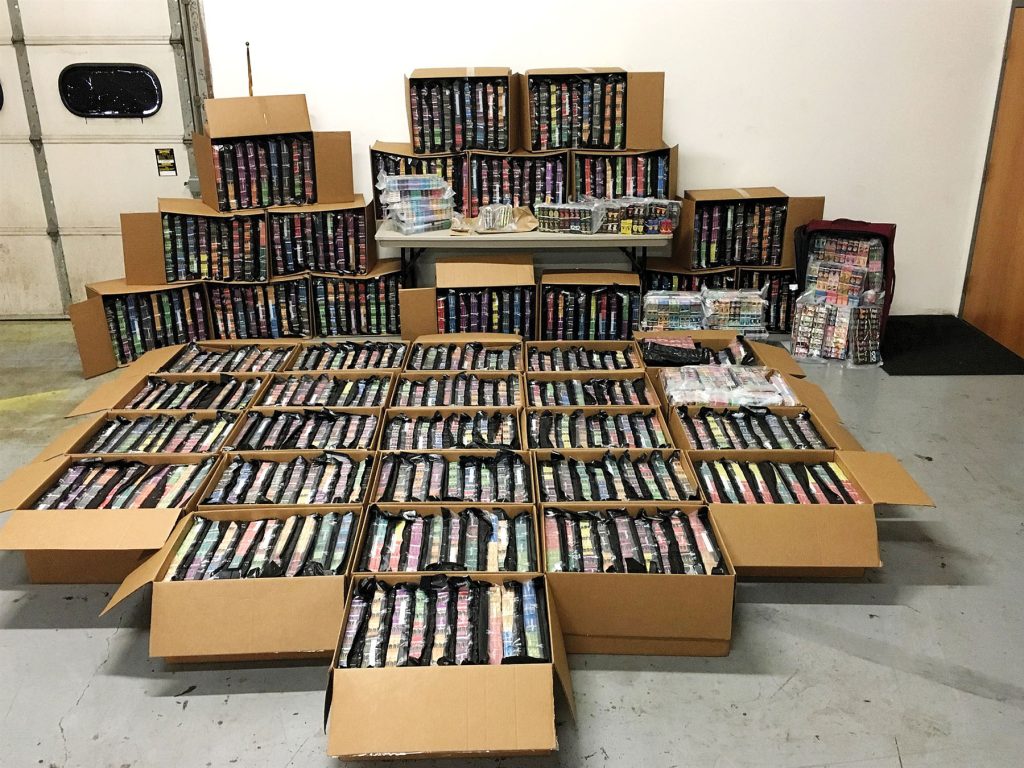
When the vape crisis reached its peak in 2019, extract producers across the country felt the pain as sales dropped and consumers became skeptical about the safety of vaping products from both legal and illicit markets. One of the brands hit hardest is California-based Loudpack Farms and its mega-popular Kingpen.
Loudpack fights back
After its introduction in 2014, Kingpen quickly became one of the most popular cartridge brands in the California. Within months, the company was on its way to building an icon. But then the counterfeits started popping up in Los Angeles, and soon thereafter in other cities—not only in California but also across the country.
Danny Corral, vice president of sales at Loudpack, said the company started to notice counterfeit Kingpen products in unlicensed shops in California several years ago and quickly began looking for the source.
“We started getting a significant amount of pushback from licensed retailers that were basically telling us that they weren’t working with us because they didn’t support people that were playing both sides of the market,” he said. “We didn’t know how bad it was until about six months later, when our sales were abysmal considering we had one of the hottest products on the market.”
When the company approached eBay about the counterfeit packages being sold on its site, the online marketplace helped shut down most of the sellers. Alibaba was not responsive, though, Corral said. Loudpack sent more than 200 cease-and-desist letters to companies selling the counterfeit products, and even sent representatives to China looking for the source of the packages. Over the past few years, Corral said, the company spent “hundreds of thousands of dollars” researching and combatting the bogus products while its brand suffered significantly in the retail market.
“We literally burned and destroyed millions of dollars in packaging and hardware just to be able to roll out new packaging.”
—Danny Corral, VP of sales, Loudpack
In response, Loudpack redesigned its packaging, creating a wrapper so detailed, elaborate, and expensive that duplicating it would be difficult. The new square metal container features the company’s signature logo—a rendering of a bearded king with bloodshot eyes—but now his face is partially obscured. Each package bears a unique code so buyers can validate the product on the company’s website. Loudpack is confident the investment will pay off.
“In terms of cost, this has been astronomical,” Corral said. “We literally burned and destroyed millions of dollars in packaging and hardware just to be able to roll out new packaging, and it was an additional $3 million to $5 million project developing our new hardware and packaging.”
Corral said in the wake of the vape crisis, consumers are wiser about looking for legitimate products, and the Kingpen brand is climbing back slowly but surely.
“What I can tell you is that our Kingpen sales prior to releasing this new technology had basically dropped roughly 70 percent since “vape gate” started,” he said. “But we have rebounded close to the type of numbers that we were seeing before, because I think people recognize and acknowledge that we were the first people to actually do something and take action.”
Loudpack is one of several cartridge companies that have invested in anti-counterfeit technologies to protect their brands. Technology companies that have worked in other industries with a knockoff problem are devising solutions that will be suitable for cannabis companies large and small.
AuthentiBrand manufactures customized holograms and other authentication tools for cannabis packages. Its HoloShield system offers track-and-trace capabilities and lets consumers validate products using an app on their phone or by visiting a website and entering a code.
NeuroTags employs a similar technology: a pre-purchase tag bearing algorithmically coupled codes. Harvey Bondar, president of NeuroTags North America, called counterfeit goods “an epidemic” that costs companies $2 trillion annually.
With NeuroTags, consumers need only scan a tag using their phone to verify the authenticity of a product. “One of the things we’ve done is put the anti-counterfeiting in a way that it’s not in the consumer’s face,” Bondar said. “Because when you start talking to them and say, ‘scan for fakes or worry about fraud,’ they worry about it. So, we’ve soft-pedaled it in a marketing context, so they see it and they go, ‘Oh, that’s good.’ They feel confident about it.”
NeuroTags’ tags also help educate consumers about unique product features and advantages, as well, and they aid in building customer trust, Bondar said. The tags are used on other products, including pharmaceuticals and alcohol.
Platinum is the first U.S. cannabis company to utilize the NeuroTags technology. The company’s vape cartridges have been counterfeited in both California and Michigan, and Chief Executive Officer George Sadler said he didn’t want to waste time coming up with solutions to address the problem.
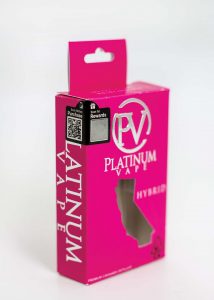
“We’ve had huge problems in Michigan with this,” he said. “The big thing is delivery services, and there’s still a lot of stores that aren’t licensed in Michigan that are going for license, and they’re still carrying the [illicit] product,” Sadler explained. “So, we’ve been able to mitigate the problem considerably. But there were actually more knock-offs being manufactured and sold in Michigan than our own products.”
Each Platinum package bears a unique NeuroTag QR code that can be scanned to authenticate the product. Customers are prompted to provide their email address, allowing Platinum to reach out to them directly to receive loyalty rewards and other incentives.
Of course, oil products aren’t the only things being counterfeited. Even small hardware companies that have carved out a niche are seeing their popular products knocked off. Such is the case with New Jersey-based Kind Pen, which has been in business for about eight years and is one of the more popular vape pen suppliers in the New York region. When business started to decline, Chief Executive Officer Anthony Gagliardi said he began visiting his clients and quickly realized what was going on.
“I went into one of my clients’ shops unexpected and saw some counterfeit pens on his shelf, and he was like, ‘Oh, hey’ and was literally at a loss for words,” Gagliardi said. “They were buying 10,000 at a time so they were saving about $2,500 to buy fake ones. I couldn’t get people to stop buying the fakes, and I couldn’t get to the root of the problem wherever they were making them.”
Beyond the technology solutions companies are pursuing to mitigate the counterfeit market, there are legal remedies, but the cost and effort involved in taking a counterfeiter to court is too great for most companies. In the meantime, more businesses may have to play the same cat-and-mouse game the U.S. Department of the Treasury has played for decades to prevent counterfeit money—create logos and packages so expensive to duplicate that counterfeiters won’t invest the time and money.
“We’re trying to save a brand that was a pioneer in this space and that is doing everything the right way,” said Corral. “So, we’re doing everything we can to protect the name and the image and the quality of the company and the products we put out on the market. If any bootlegger is coming in and trying to replicate the packaging and the special tech we have, then more power to you. But I don’t think there’s money in it.”







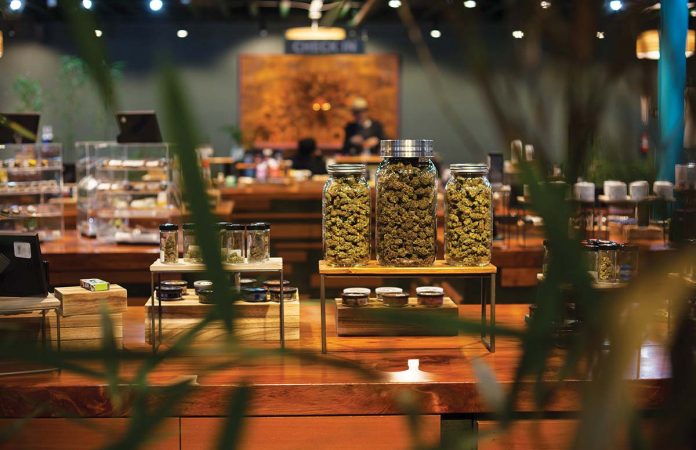

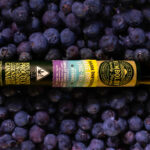



[…] Counterfeit products have been a challenge for the industry since its earliest days, threatening revenues, brand reputations, and consumer safety. Regulators and law enforcement in many states mostly ignored a thriving illicit market selling extremely convincing knockoffs for one-third to one-half the price of legal goods … until projected tax revenues plummeted by as much as 75 percent in 2019. One California operator destroyed “millions of dollars in packaging and hardware” in an attempt to reclaim its identity from counterfeiters in New York, where the problem still threatens to wreck a new adult-use market. […]